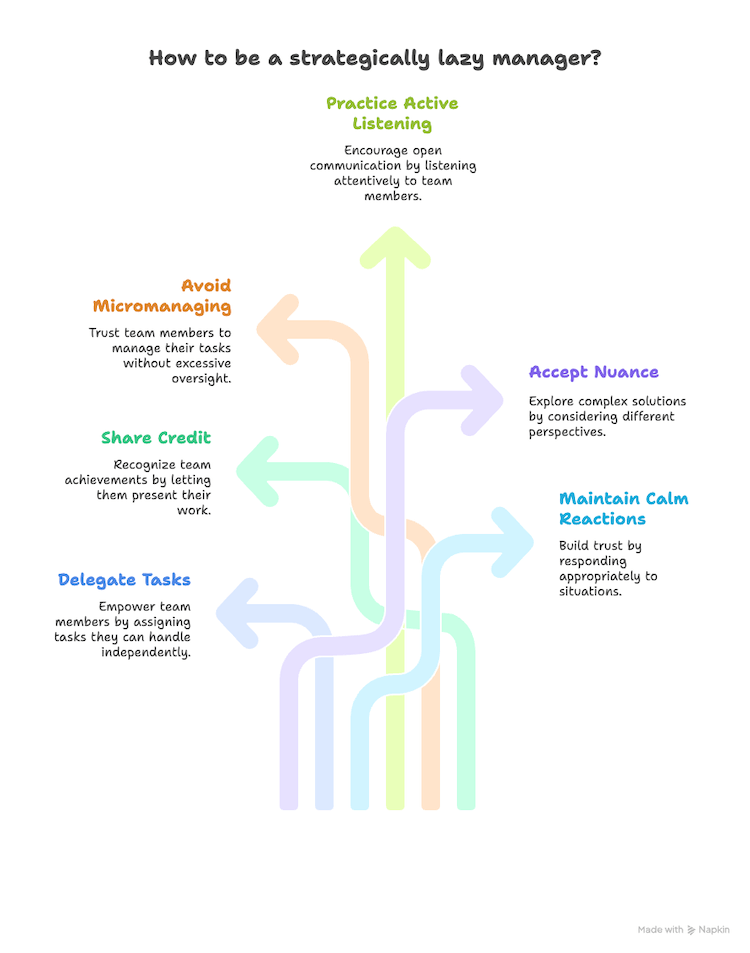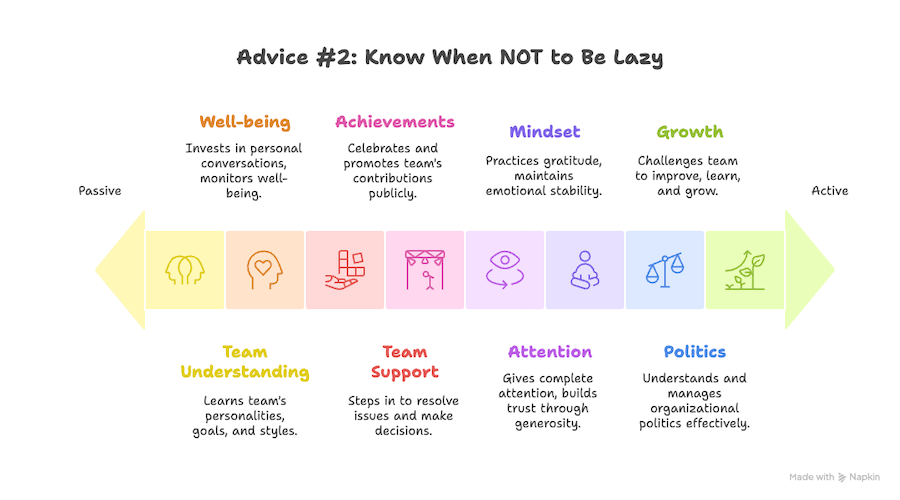I feel for new middle managers. Call me old-fashioned, but I still firmly believe in the value of middle management.
Middle managers are the glue that binds teams together, the bridges connecting different groups, and the support system that provides safety, clarity, and direction for individual contributors.
Yet, middle management often feels overwhelming, especially for those just stepping into the role.
Clear, actionable advice for new middle managers is scarce. You’re expected to lead and motivate teams. Yet you often lack specific guidance. Many new middle managers aren’t formally trained for management; they’re simply promoted because they were strong individual contributors.
In addition, typical leadership or management advice is often abstract: "Leaders eat last," "lead with vision," or other grand concepts that aren't actionable or clear when you're new to managing teams.
In this post, I thought I’d break down some practical, experience-based advice for new middle managers into two straightforward concepts:
1. Be strategically lazy most of the time.
2. Know precisely when NOT to be lazy.
Let me clarify:
Being lazy as a manager doesn't mean you're disengaged or indifferent. Quite the opposite: it means strategically stepping back, creating space for your team to grow, make decisions, and thrive independently.
Here’s my advice for new middle managers on when to practice strategic laziness and when to actively engage:
Advice #1: Be Strategically Lazy

- Don’t do tasks your team can and should do themselves. Give them the autonomy and trust they need to learn and grow independently. Don’t solve technical problems for them, or schedule their meetings, or lead the conversations they need to lead to improve their communication skills.
- Don’t take credit for your team’s wins. Step back intentionally. Ensure your team members present their own ideas, proposals, and work. As a middle manager, your role is to empower and support them, not overshadow their achievements.
That’s a hard one for new managers. Finding fulfillment or usefulness when you switch to management can be a tricky task in the beginning. I write about it here in Step 2. - Don’t micromanage. Resist the urge to control or excessively check in on every small task. Trust your team’s capability and judgment. Being lazy in this context means allowing them the freedom to succeed, and sometimes to learn from mistakes.
I can say this about every bullet point, but this is hard too. I write about it in more details in my Effective Delegation post. - Practice active listening. Active listening may sound like special advice, but it’s straightforward: be genuinely curious, let people speak freely, and ask thoughtful follow-up questions. Most solutions naturally come in without your intervention when you adopt this mindset.
I listed this under the Lazy section because I really believe that listening is easier and lazier than talking all the time, and feeling like you need to solve everything. - Accept nuance. Life isn’t ones and zeros, and the challenges you’ll face as a new middle manager aren’t binary. Allow thoughtful conversations to explore nuanced solutions. The best answers often exist in shades of gray, like 0.85 or 0.17.
- Keep extreme reactions minimal. When your responses consistently match the situation, your team will trust your judgment and leadership. Avoid excessive panic or exaggerated positivity. Strategically lazy managers maintain calm, steady, and balanced reactions, building a stable environment for their teams.
Advice #2: Know When NOT to Be Lazy

While strategic laziness has its benefits, effective leadership also requires actively engaging in key areas. This second set of actionable advice for new middle managers clarifies when to lean in:
- Deeply understand your team members. Take the time to learn about each team member’s personality, hobbies, strengths, weaknesses, goals, communication style, and working style. Actively facilitate team cohesion and strong relationships. Great teamwork rarely happens accidentally.
I cover this topic in my Safe Team Culture post. - Regular 1:1s and your team’s well-being. Invest time consistently in personal conversations. Understand each individual’s productivity, mental health, and potential signs of burnout. Provide proactive and constructive feedback privately—this is essential and non-negotiable advice for new middle managers.
I highly recommend this post on Leading with Courage to help with this point. - Step in when the team is genuinely blocked. If your team struggles with a significant issue, actively engage. Make prompt decisions, even if they aren’t perfect, to allow progress. Bias towards action, most of the time. Remove roadblocks, facilitate discussions, or escalate to higher management as needed.
- Celebrate and market your team’s achievements. Public recognition of your team’s contributions is crucial. Your active advocacy ensures team members feel valued and recognized throughout the organization. Celebrating wins is motivating and encourages ongoing excellence.
I discuss recognition in this blog post. - Give your attention generously. The French philosopher Simone Weil once said, “Attention is the rarest and purest form of generosity.” Your complete, active attention in meetings and conversations demonstrates respect and builds trust, critical components for successful middle management.
- Improve your mindset and emotional leadership. As a middle manager, practice gratitude and mindfulness. Don’t take issues personally. Maintain emotional stability and resilience.
Shield your team from negativity and organizational distractions, allowing them to focus on essential tasks. Welcome challenges, remain patient, and consciously model positivity and energy. - Navigate organizational politics. Shielding your team from negativity doesn’t mean ignoring organizational politics; it means being aware of them. Actively understand and manage these dynamics yourself, making sure your team remains productive and motivated, while effectively advocating on their behalf.
They only need to be exposed to these things that are affecting their careers, the projects they are on, or if there’s a company-wide change. - Find ways, projects, and tasks that challenge your team and its members to continually improve, learn, and grow.
Conclusion
Being a middle manager is demanding but deeply rewarding, especially when you master the art of strategic laziness combined with active engagement.
This practical advice for new middle managers boils down to this:
Step back whenever possible, giving your team room to grow by trusting them to handle their own tasks and decisions. Keep your reactions balanced, embrace nuance, and practice genuine active listening.
At the same time, never hesitate to support your team when they genuinely need it. Invest time in consistent one-on-one meetings, pay close attention to your team’s well-being, and proactively celebrate their wins.
Take responsibility for navigating organizational politics, so your team can focus on what matters most.
Remember, your role isn’t to do everything yourself. Your role is to build a resilient and self-sufficient team that can thrive independently.
Thank you so much for reading!
